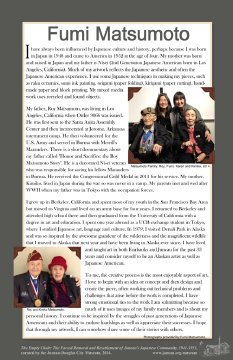|
Description
|
| Fumi Matsumoto I have always been influenced by Japanese culture and history, perhaps because I was born in Japan and came to America at the age of four. My mother was born and raised in Japan and my father is Nisei (Second Generation Japanese American born in Los Angeles, California). Much of my artwork reflects the Japanese aesthetic and often the Japanese American experience. I use some Japanese techniques in making my pieces, such as raku ceramics, sumi ink painting, origami (paper folding), kirigami (paper cutting), handmade paper and block printing. My mixed media work uses recycled and found objects. My father, Roy Matsumoto, was living in Los Angeles, California when Order 9066 was issued. He was first sent to the Santa Anita Assembly Center (race track) and then incarcerated at Jerome, Arkansas internment camp. He then volunteered for the U.S. Army and served in Burma with Merrill's Marauders. There is a recent short documentary movie about my father, "Honor and Sacrifice, the Roy Matsumoto Story". He is a decorated Nisei veteran who was responsible for saving his fellow Marauders in Burma. He received the Congressional Gold Medal in 2011 for his service. My mother, Kimiko, lived in Japan during the war so was never in a camp. My parents met and wed after WWII when my father was in Tokyo with the occupation forces. I was born in Tokyo in 1948 and we did not move back to America until 1952. I grew up in Berkeley, California and spent most of my youth in the San Francisco Bay Area but moved to Virginia and lived on an army base for four years. I returned to Berkeley and attended high school there and then graduated from the University of California with a degree in art and education. I spent one year abroad as a UCB exchange student in Tokyo, where I studied Japanese art, language and culture. In 1979, I visited Denali Park in Alaska and was so inspired by the awesome grandeur of the wilderness and the magnificent wildlife that I moved to Alaska that next year and have been living in Alaska ever since. I have lived and taught art in both Fairbanks and Juneau for the past 33 years and consider myself to be an Alaskan artist as well as Japanese American. To me, the creative process is the most enjoyable aspect of art. I love to begin with an idea or concept and then design and create the piece, often working out technical problems and challenges that arise before the work is completed. I have strong emotional ties to the work I am submitting because so much of it uses images of my family members and is about my personal history. I continue to be inspired by the struggles of past generations of Japanese Americans and their ability to endure hardships as well as appreciate their successes. I hope that through my artwork, I can somehow share some of their stories with others. * Fumi Matsumoto loaned 7 works of art for display during the exhibition. Image captions (All images provided by Fumi Matsumoto): Matsumoto Family: Roy, Karen, Fumi, and Kimiko, 2014. Roy and Kimiko Matusmoto. |
Fumi Matsumoto Art Intro Panel
-The Empty Chair: The Forced Removal and Relocation of Juneau's Japanese, 1941-1951
-Permission to use this image may be obtained by contacting museum staff.

All images are the property of the Juneau-Douglas City Museum. No image may be copied, downloaded or reproduced without the express permission of the Juneau-Douglas City Museum.

All images are the property of the Juneau-Douglas City Museum. No image may be copied, downloaded or reproduced without the express permission of the Juneau-Douglas City Museum.